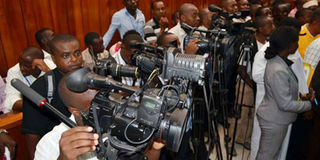End justifies means only under very strict conditions

Television cameramen at work at the High Court in Mombasa on October 15, 2014. PHOTO | KEVIN ODIT | NATION MEDIA GROUP
What you need to know:
Whether or not the end justifies the means is an old moral philosophical debate that goes back to the years before Jesus Christ.
It is a question found in all kinds of life situations.
Commenting on one of my articles, Nancy Wacinga said she completely disagreed with one of my observations with regard to a particular case that the end justifies the means.
“The end absolutely, completely and totally NEVER justifies the means. NEVER. As a journalist, an experienced one at that and one also tasked with ensuring particular standards are met, you should be at the forefront of advocating ethics in the Press. Saying the end justifies the means is offering carte blanche to journalists to write whatever they will, the veracity of their content notwithstanding, in order to achieve a particular outcome,” she wrote.
I made my observation with regard to one of the parties who appeared not to be telling the truth in the story of Brian Karuga, who went to India for a kidney transplant. Whether or not the end justifies the means is an old moral philosophical debate that goes back to the years before Jesus Christ.
It is a question found in all kinds of life situations. A clear and international example is the killing of Osama bin Laden by the US military in a house in Pakistan on May 2, 2011. The moral issue here is killing one person to save many. Another example is Julian Assange, who stole thousands of secret US Government documents and posted them on the Internet in the name of transparency and truth. In journalistic practice, it is accepted that journalists can do things that are morally wrong to achieve outcomes that are morally good. A journalist can, for example, pretend to be what he is not in order to obtain information that will be in the public interest.
JOHN-ALLAN NAMU
For example, in a case that upset the Kenya Revenue Authority so much it complained to the Media Council’s Complaints Commission (Complaint No. 075 of 2010), investigative journalist John-Allan Namu pretended to be a bona fide auto spare parts importer. He placed an order for assorted spare parts from Dubai through a company called Al Shamali Auto Parts. His aim was to prove that there was corruption at the Port of Mombasa. The clearing agent asked him to pay Sh51,000 as taxes, but he paid only Sh41,600 after bargaining. His own investigation had revealed that the taxes due on the goods amounted to at least Sh150,000.
But good journalism demands that the public interest be legitimate. It was not a clear case of public interest, for example, when Ciku Muiruri, who used to host the Busted show broadcast by Classic 105 FM, pretended to be the wife of a man who was having an affair with his secretary (Agnes). She called Agnes.
Ciku: You are not having an affair with my husband?
Agnes: No. No, I can’t do such a thing.
Ciku: Now, Agnes, you need to know I haven’t called to fight with you and I have not called to make any accusations. I just called to give you some information, which I think is going to help you. You know I am a saved woman and I let God guide me in all decisions I make and everything I do. I just called to warn you that my husband has been diagnosed with something very serious.
Agnes: What is it?
Ciku: He’s HIV-positive. He is positive. He has also infected me. I am also positive.
The rest of the conversation was punctuated by a series of cries of, “Oh my God” by Agnes.
The Complaints Commission (in complaint No. 91 of 2010) did not find that in this case the means justified the end.
In journalism, too, deception as a tool for gathering information is not allowed if the information could have been obtained using other means. That is why Christopher Murungaru, a former Cabinet minister, won a case against KTN (Complaint No. 20 of 2011) in which investigative journalists Mohammed Ali and Dennis Onsarigo secretly videotaped him for a documentary, The Untouchables, broadcast in November 2011.
In journalism the end justifies the means only under very strict conditions.
Send your complaints to [email protected]; call 0721989264.




